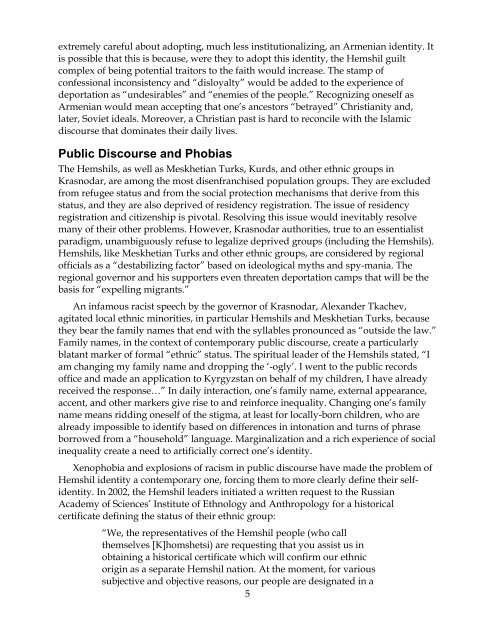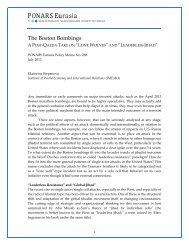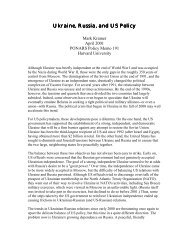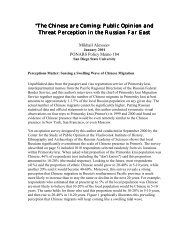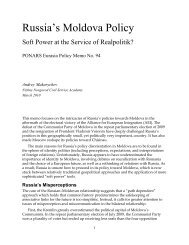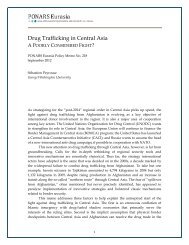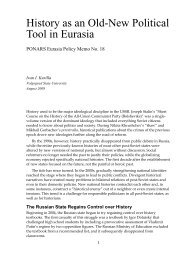HEMSHIN, HOMSHETSI, OR HEMSHINLI? - PONARS Eurasia
HEMSHIN, HOMSHETSI, OR HEMSHINLI? - PONARS Eurasia
HEMSHIN, HOMSHETSI, OR HEMSHINLI? - PONARS Eurasia
- No tags were found...
You also want an ePaper? Increase the reach of your titles
YUMPU automatically turns print PDFs into web optimized ePapers that Google loves.
extremely careful about adopting, much less institutionalizing, an Armenian identity. Itis possible that this is because, were they to adopt this identity, the Hemshil guiltcomplex of being potential traitors to the faith would increase. The stamp ofconfessional inconsistency and “disloyalty” would be added to the experience ofdeportation as “undesirables” and “enemies of the people.” Recognizing oneself asArmenian would mean accepting that one’s ancestors “betrayed” Christianity and,later, Soviet ideals. Moreover, a Christian past is hard to reconcile with the Islamicdiscourse that dominates their daily lives.Public Discourse and PhobiasThe Hemshils, as well as Meskhetian Turks, Kurds, and other ethnic groups inKrasnodar, are among the most disenfranchised population groups. They are excludedfrom refugee status and from the social protection mechanisms that derive from thisstatus, and they are also deprived of residency registration. The issue of residencyregistration and citizenship is pivotal. Resolving this issue would inevitably resolvemany of their other problems. However, Krasnodar authorities, true to an essentialistparadigm, unambiguously refuse to legalize deprived groups (including the Hemshils).Hemshils, like Meskhetian Turks and other ethnic groups, are considered by regionalofficials as a “destabilizing factor” based on ideological myths and spy-mania. Theregional governor and his supporters even threaten deportation camps that will be thebasis for “expelling migrants.”An infamous racist speech by the governor of Krasnodar, Alexander Tkachev,agitated local ethnic minorities, in particular Hemshils and Meskhetian Turks, becausethey bear the family names that end with the syllables pronounced as “outside the law.”Family names, in the context of contemporary public discourse, create a particularlyblatant marker of formal “ethnic” status. The spiritual leader of the Hemshils stated, “Iam changing my family name and dropping the ‘-ogly’. I went to the public recordsoffice and made an application to Kyrgyzstan on behalf of my children, I have alreadyreceived the response…” In daily interaction, one’s family name, external appearance,accent, and other markers give rise to and reinforce inequality. Changing one’s familyname means ridding oneself of the stigma, at least for locally-born children, who arealready impossible to identify based on differences in intonation and turns of phraseborrowed from a “household” language. Marginalization and a rich experience of socialinequality create a need to artificially correct one’s identity.Xenophobia and explosions of racism in public discourse have made the problem ofHemshil identity a contemporary one, forcing them to more clearly define their selfidentity.In 2002, the Hemshil leaders initiated a written request to the RussianAcademy of Sciences’ Institute of Ethnology and Anthropology for a historicalcertificate defining the status of their ethnic group:“We, the representatives of the Hemshil people (who callthemselves [K]homshetsi) are requesting that you assist us inobtaining a historical certificate which will confirm our ethnicorigin as a separate Hemshil nation. At the moment, for varioussubjective and objective reasons, our people are designated in a5


